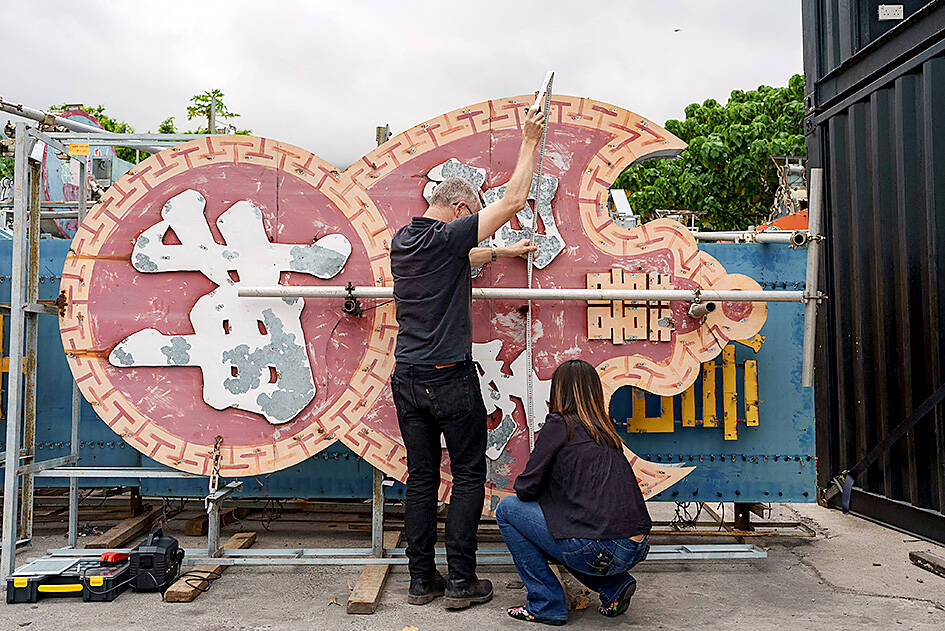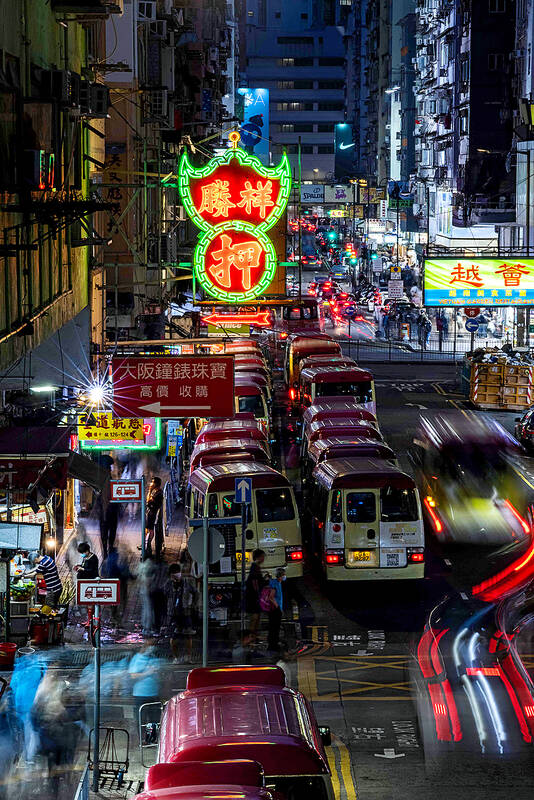Neon signs once transformed Hong Kong’s oldest neighborhoods into a kaleidoscope of luminous color after dark, but most have been removed with a few lucky ones now piled up in a ramshackle yard.
Citing safety concerns, city authorities have begun extinguishing the neon signs, which are widely seen as part of Hong Kong’s heritage.
“It is very heartbreaking to hear the sound of the glass being smashed,” said conservationist Cardin Chan.

Photo: AFP
Chan is part of a preservation campaign led by Tetra Neon Exchange (TNX), which has an open-air storage yard that maintains a treasure trove of historic signs taken down by the city. She says she is on a mission to “save” the glowing billboards, which once numbered in the thousands.
There are now around 500 signs left, based on a count carried out last year by TNX. The group’s latest acquisition is a pair of double-circle-shaped behemoths depicting a bat clawing a coin.
Once hoisted outside a pawn shop in the working-class Sham Shui Po district, news of their pending removal had quickly spread on social media, drawing dozens of enthusiasts eager to take pictures of their last light.

Photo: AFP
“I’ll be very sad to see the signs come down. They’re beautiful things, with very warm, welcoming colors,” store owner Dan Ko said the day before they were removed.
“It’s an integral part of the city’s visual history.”
‘AN ART PIECE’
Neon once illuminated the diverse businesses that pockmarked Hong Kong’s streets, announcing in hues of bright green, red, blue and yellow the availability of bridal wear, jewelery, hotel rooms, fishball noodles and much more.
“Our streets used to be a living gallery,” Chan says. But the signs pose a “persistent building safety problem,” according to Hong Kong’s buildings department, and uninstalling them can be a delicate task. The ones from Ko’s pawn shop were three meters in length and two in width, with dozens of handcrafted neon tubes running through them. A single worker spent hours meticulously removing the tubes while keeping the electronics intact, some of which have been untouched since they were first erected decades ago.
They depict a complex “double happiness” Chinese character atop the pawn shop’s name — unique to Ko’s chain — which is what initially caught Chan’s eye.
“It’s an art piece. It is not like a piece of junk metal,” she says.
She spent almost a month looking for Ko, before convincing him to preserve his signs. Today, they are nestled against other faded plaques adorned with intricate designs — ranging from Chinese characters to palm trees — in a rural part of Yuen Long district.
Chan hopes to one day display them in a “museum-grade facility” safe from the elements, but TNX “can’t afford it” at the moment.
“It was sad for me to see the signs removed. They could no longer be seen in their natural habitat,” Chan says. “But I think as a consolation, at least we could give them a home instead of witnessing them being trashed.”

On April 26, The Lancet published a letter from two doctors at Taichung-based China Medical University Hospital (CMUH) warning that “Taiwan’s Health Care System is on the Brink of Collapse.” The authors said that “Years of policy inaction and mismanagement of resources have led to the National Health Insurance system operating under unsustainable conditions.” The pushback was immediate. Errors in the paper were quickly identified and publicized, to discredit the authors (the hospital apologized). CNA reported that CMUH said the letter described Taiwan in 2021 as having 62 nurses per 10,000 people, when the correct number was 78 nurses per 10,000

As we live longer, our risk of cognitive impairment is increasing. How can we delay the onset of symptoms? Do we have to give up every indulgence or can small changes make a difference? We asked neurologists for tips on how to keep our brains healthy for life. TAKE CARE OF YOUR HEALTH “All of the sensible things that apply to bodily health apply to brain health,” says Suzanne O’Sullivan, a consultant in neurology at the National Hospital for Neurology and Neurosurgery in London, and the author of The Age of Diagnosis. “When you’re 20, you can get away with absolute

May 5 to May 11 What started out as friction between Taiwanese students at Taichung First High School and a Japanese head cook escalated dramatically over the first two weeks of May 1927. It began on April 30 when the cook’s wife knew that lotus starch used in that night’s dinner had rat feces in it, but failed to inform staff until the meal was already prepared. The students believed that her silence was intentional, and filed a complaint. The school’s Japanese administrators sided with the cook’s family, dismissing the students as troublemakers and clamping down on their freedoms — with

As Donald Trump’s executive order in March led to the shuttering of Voice of America (VOA) — the global broadcaster whose roots date back to the fight against Nazi propaganda — he quickly attracted support from figures not used to aligning themselves with any US administration. Trump had ordered the US Agency for Global Media, the federal agency that funds VOA and other groups promoting independent journalism overseas, to be “eliminated to the maximum extent consistent with applicable law.” The decision suddenly halted programming in 49 languages to more than 425 million people. In Moscow, Margarita Simonyan, the hardline editor-in-chief of the